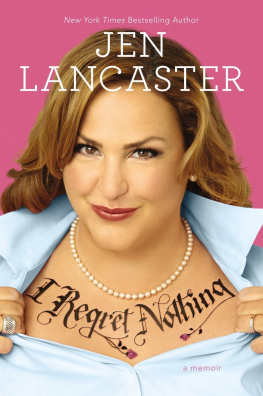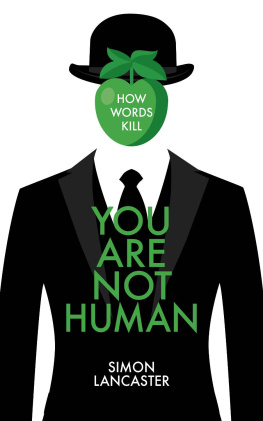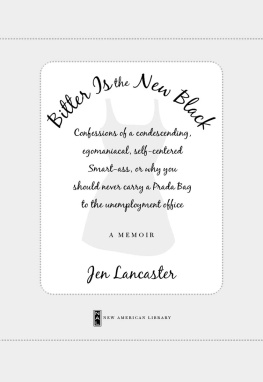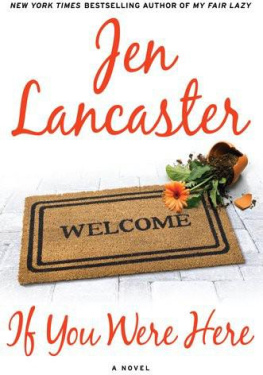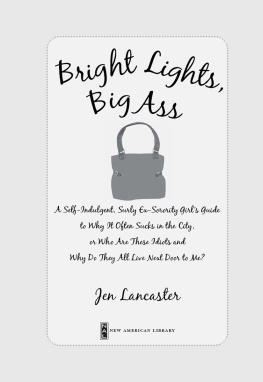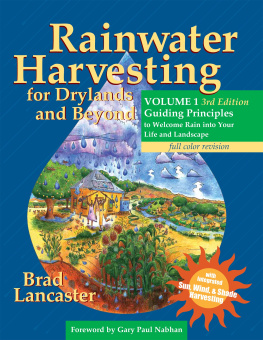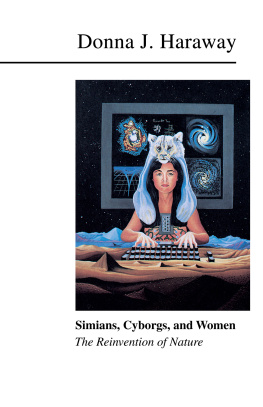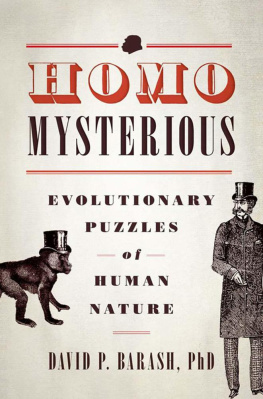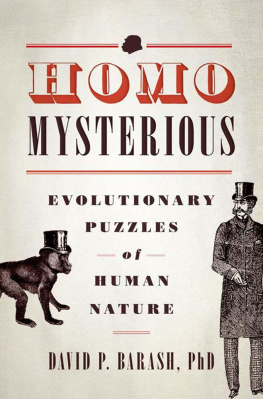PRAISE FOR ROGER N. LANCASTERS The Trouble with Nature
Sex, lies, and videotape. Culture wars, science wars, and its the economy, stupid. With interdisciplinary brilliance and biting wit, Lancaster makes sad sense of sociobiologys contemporary renaissance while dissecting its popular and scholarly practitioners. But Lancasters decidedly queer perspective connects science to shifting sexuality, family, and economic inequality in the cultural stew of the present. E.M. Forster famously adjured us to only connect. What does Will and Grace have to do with post-Fordist economies? Journalists just-so stories about ducks and sex with the 9/11 terror? The Trouble with Nature connects us all, in surprisingly new ways. MICAELA DI LEONARDO, author of Exotics at Home: Anthropologies, Others, American Modernity
What is a woman, man, the homosexual, or heterosexual? asks Roger Lancaster in this lively, engaging new book. And well may he ask as, once again, academic pop stars hawk their biodetermined creations. Eschewing simplistic caricatures, he offers vivid examples of the ambiguities, contradictions, and complexities that characterize real people, while showing how the biomyths serve to revivify constricting ideologies about sex and family. An original and fascinating book. RUTH HUBBARD, author of Exploding the Gene Myth and The Politics of Womens Biology
The Trouble with Nature is a brilliant, wide-ranging, masterful critique of the cultural impact of sociobiology and evolutionary psychology on popular as well as scholarly understandings of gender, sexuality, and political economy. There are no cheap, trendy shots at science here, nor grandstand gestures to the prejudices of cultural relativists. Lancaster displays the skills of a science journalist while producing a major cultural studies opus. JUDITH STACEY, author of In The Name of the Family: Rethinking Family Values in the Postmodern Age
Provocative, witty, illuminating, and politically pointed, The Trouble with Nature shows us how the flat-footed fixities of biological reductionism limit and constrain us and why we need an expansive progressive political imagination to free us. LISA DUGGAN, coauthor of Sex Wars: Sexual Dissent and Political Culture
The Trouble with Nature will be a valuable addition to my library. It is a book I will want to share with colleagues and students. A pleasure to read, it is full of insights about the place of sexuality in popular consciousness. Lancaster has written a personal and a political study while avoiding many of the clichs too common in contemporary cultural criticism. LAWRENCE GROSSBERG, author of Dancing in Spite of Myself: Essays on Popular Culture
The Trouble with Nature
The Trouble with Nature
Sex in Science and Popular Culture
ROGER N. LANCASTER

University of California Press
Berkeley and Los Angeles, California
University of California Press, Ltd.
London, England
2003 by the Regents of the University of California
Library of Congress Cataloging-in-Publication Data
Lancaster, Roger N.
The trouble with nature : sex in science and popular culture / Roger N. Lancaster.
p. cm.
Includes bibliographical references and index.
ISBN 0-520-20287-2 (alk. paper).ISBN 0-520-23620-3
(pbk. : alk. paper)
1. Sex in popular culture. 2. Science news. 3. Pseudoscience. 4. Sexual orientationPhysiological aspects. I. Title.
HQ23 .L29 2003
306.7dc21
2002002311
Manufactured in Canada
12 11 10 09 08 07 06 05 04 03
10 9 8 7 6 5 4 3 2 1
The paper used in this publication is both acid-free and totally chlorine-free (TCF). It meets the minimum requirements of ANSI/NISO Z39.481992 (R 1997) (Permanence of Paper).
My suspicion is that the universe is not only queerer than we suppose, but queerer than we can suppose.
J. B. S. HALDANE
Naturalism has served as deceptively in the modern world as supernaturalism ever did in the past.
KENNETH BURKE
We have to understand that with our desires, through our desires, go new forms of relationship, new forms of love, new forms of creation.
MICHEL FOUCAULT
Contents
Illustrations
Acknowledgments
Let me say right off that I feel like Ive been wading through a toxic waste dump of ideas for the better part of several years, pressing little exhibits into my media scrapbook like Doris Lessing on a bad day. Actually, it didnt start off that way. A materialist with a bit of a vulgar streak, I began this project more than a little weary of the airy idealist conceits that have dominated recent discussions of sex in anthropology and cultural studies. Looking for approaches that might put some body into discussions of the body, I had hoped to discover sophisticated new biological perspectives on sex and sexuality. What I encountered instead was the same old reductivism warmed over: the belief that complex social identities are scripted in strands of DNA. The notion that desires are coded, microscopically, in the genes. Ideas about social good (and ill), staged as media-savvy evolutionary just-so stories.
Lots of scholars feign sophistication on these matters, but my research methods for this project were simple enough: I read newspapers and news weeklies to monitor what kinds of science studies made headlines, and to track how scientific claims about gender and sexuality entered into public discourse. For a time, I almost imagined subtitling this book Reading the New York Times Science News (with apologies to Catherine Lutz and Jane Collins), for it seemed that if a science story was deemed newsworthy in that influential paper, chances were good youd also see it in the Washington Post or in Newsweek or in some other national news source. In addition to reading the papers, I watched network news and, contretemps, TV entertainment programs, taking notes on treatments of gender and sexuality in those very different venues. (Okay, I admit it: I would probably have watched a certain amount of TV anywayprobably not ABCs Home Improvement, but definitely WBs Buffy the Vampire Slayer.) Over time, Ive tried to tame a free-flowing series of impromptu notes into something more closely resembling book chapters. The ensuing text follows the flickering line between media studies and science studies, lesbigay and gender studiesas informed by my more conventional academic training and research in anthropology and specifically by my interest in cultural studies.
I cannot say whether this book is a work of the auto-ethnographic sort, or whether it belongs to the genre of cultural criticism. I hope it represents a bit of both. My role models are Roland Barthes, who appropriately camped up a reading of nature at the confluence of Marx, Lukcs, and Saussure in Mythologies; Marshall Sahlins, who dispatched the first wave of sociological ideas with considerable panache in The Use and Abuse of Biology (a book whose basic arguments have not been superseded in twenty-five years); and the Left biologistsAnne Fausto-Sterling, Stephen Jay Gould, Ruth Hubbard, and Richard Lewontin. Ive drawn special inspiration from gay-studies scholars like Lisa Duggan, Lauren Berlant, and Michael Warner, authors of exceptional talent whove written about mass culture and have sometimes attempted to mediate between the often recondite field of queer theory and the public sphere. (I cribbed this books title from Warners
Next page

